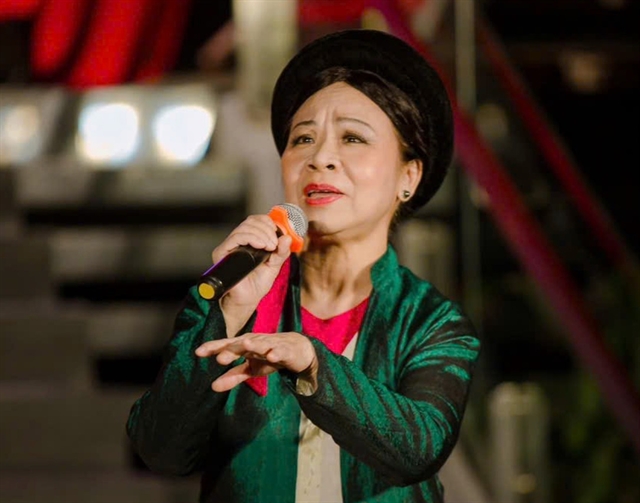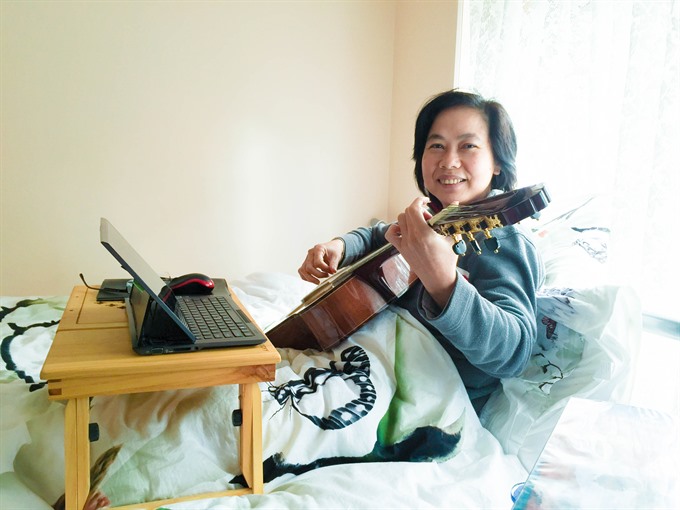 Inner Sanctum
Inner Sanctum

Võ Thị Hoàng Yến – founder of the organisation Disability Research and Capacity Development (DRD) recently won the honourable Ramson Magsaysay Award, which honours transformative leaders across Asia.
 |
| Iron will: Dr Võ Thị Hoàng Yến. Photo Australia Award Vietnam |
Woman with polio shines a light for all with disabilities
Born and raised in a poor family in the southern province of Đồng Nai, she contracted polio when she was two-and-a-half years old. In addition to her sickness, she was rejected from jobs solely because of her disability and experienced widespread discrimination from society at large.
But she stood up from the dust, and with incredible will, determination and wholehearted love from her mother, she was able to qualify to attend two major universities in HCM City. She later won two full scholarships to earn a master’s degree and a doctorate in the US and Australia.
She came back to Việt Nam and started a project to help other people with disabilities lead a better life. She is Võ Thị Hoàng Yến – founder of the organisation Disability Research and Capacity Development (DRD). She recently won the honourable Ramson Magsaysay Award, which honours transformative leaders across Asia.
Hoàng Hồ had a chance to hear Yến shared about her inspirational journey.
Inner Sanctum: I would like to congratulate you on winning the Ramson Magsaysay 2018. What does this mean to you and to people with disabilities (PWDs)?
Honestly, the prize was a great surprise to me. But then I think that what I have done so far is recognized by the world as having a positive impact on the community of the disabled. And it is very likely that information about the prize will also help Viet Nam - and even the world - know and care more about community development programmes in the country.
Inner Sanctum: It’s been almost 13 years since the day you started the project Disability Research and Capacity Development (DRD). What was the turning point that led you to this journey?
When I graduated university in 1990, I applied for a chief accountant position at a company. Because I was sitting there before the director came in, he didn’t know that I’m a PWD. He was very satisfied with my interview and I was accepted. But after my first day at work, I was told to return home and wait for another call, and that call never come.
After that, even though I continued to study at another university, I still couldn’t get any job. Without any explanation, I knew that it was because of my disability. Why are PWDs discriminated against? I was shocked and worry about the future of PWDs like me.
From then on, I had the desire to do something for the disabled. I was lucky to receive a full master’s scholarship from the Ford Foundation to study in the US. After studying human development at Kansas University, I refused to stay and work in the US despite many job offers and came back to Việt Nam to fulfill my mission. After my return, I taught at Hồ Chí Minh City Open University and Đà Lạt University, and with seven others, I started planning and building DRD to support people with the same pain.
Inner Sanctum: After studying human development and social work abroad, what lessons do you think are best applied to your project in particular and policies for the disabled in Viet Nam in general?
We have and still are implementing three approach methods: (1) increase ability and rights for the empowerment group; (2) supporting PWDs in the social model; and (3) assets-based approach. DRD always seeks to improve the ability of the disabled so that they can best leverage their abilities. Many students have received DRD scholarships and participate in skills classes and group activities, which transform their lives.
Unlike my generation, students with disabilities are receiving a lot of support. The monthly allowance, medical insurance and tuition discounts and scholarships for the disabled have contributed to creating opportunities for them. New public transport and public works also began to take into account people with disabilities. However, despite the progressive legal framework and strong government commitment, there is still a big gap between the policies and the practical implementation.
Inner Sanctum: You have shared about the difficulties of obtaining sufficient funding, which is mainly available from international organizations? Do you have hope that in the future the disabled will receive more funds and development policies from government and society?
The world aims to get rid of specialised centres for the disabled so that they can live with their families or communities and participate in all fields of society. However, for disadvantaged (financial, environmental, etc) countries like Viet Nam, the disabled face many difficulties living in their families or in the community. So the centres may be a better choice for them. However, as far as I know, the disabled living in these centres can only develop their abilities or have a better quality of life if they are equipped with the knowledge of laws and policies on PWDs.
I think the disabled are often on the priority list when individuals or organizations plan to do charity, so it is not too hard to find material support. However, if these individuals or organizations are still interested in ordinary charitable causes, they tend to have less interest in supporting programmes like DRD. International donor organisations change their sponsorships over the years and usually only fund poor countries, while Viet Nam is considered a middle-income country, so NGOs such as DRD are also facing problems. We have difficulties in maintaining activities, even though we are evaluated as effective. For a long time, we have heard about the government’s intention to transfer public services to social organisations to work effectively, but it is unclear what has been done so far and how DRD might be able to access such resources.
Inner Sanctum: What are your expectations for the future?
Although DRD has completed the strategic plan up to 2017-2025, it is difficult to know how much will be achieved because the world is changing so fast. Our plan to raise funds and build a cultural centre named “Beautiful life” is also underway. I hope that the added prestige from the Ramon Magsaysay Prize will help DRD gain more supporters, and if there is more support and more qualified personnel, DRD will achieve its goal.VNS




